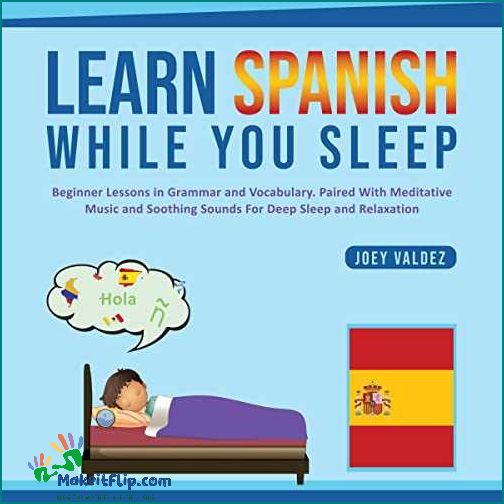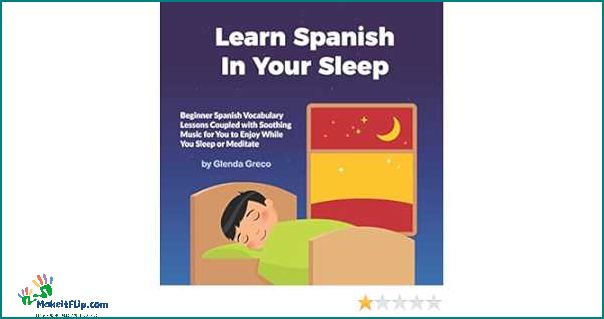Contents
- 1 A Complete Guide to Spanish Sleep Vocabulary: How to Say “To Sleep” in Spanish and More
- 1.1 Common Spanish Words and Phrases Related to Sleep
- 1.2 FAQ about topic To Sleep in Spanish A Comprehensive Guide to Spanish Sleep Vocabulary
- 1.2.1 What are some common Spanish words for “to sleep”?
- 1.2.2 How do you say “I’m going to bed” in Spanish?
- 1.2.3 What are some Spanish words for different sleep positions?
- 1.2.4 Are there any specific Spanish words for different sleep disorders?
- 1.2.5 What are some Spanish phrases for talking about dreams?
- 1.2.6 What are some common phrases related to sleep in Spanish?
- 1.2.7 How do you say “goodnight” in Spanish?
A Complete Guide to Spanish Sleep Vocabulary: How to Say “To Sleep” in Spanish and More

When it comes to learning a new language, it’s important to not only focus on grammar and vocabulary, but also on everyday topics that we often take for granted. One such topic is sleep. In this comprehensive guide, we will explore the Spanish vocabulary related to sleep, including common phrases, expressions, and words that will help you navigate conversations about this essential part of our lives.
Whether you’re a beginner or an advanced learner of Spanish, this guide will provide you with the tools you need to talk about sleep in a meaningful way. From discussing your sleep routine to describing your dreams, we will cover it all. So, grab your favorite blanket, get comfortable, and let’s dive into the world of Spanish sleep vocabulary!
First, we will start with some basic phrases and expressions that you can use to talk about sleep in Spanish. For example, if you want to ask someone if they had a good night’s sleep, you can say “¿Dormiste bien?” (Did you sleep well?). Or, if you want to let someone know that you’re going to bed, you can say “Me voy a dormir” (I’m going to sleep).
Next, we will explore some common words that are related to sleep. For instance, the word “sueño” means “sleep” in Spanish, while “dormitorio” refers to a bedroom. We will also look at words like “insomnio” (insomnia) and “pesadilla” (nightmare) that are used to describe sleep-related problems and experiences.
So, whether you’re planning a trip to a Spanish-speaking country or simply want to expand your vocabulary, this guide will provide you with the knowledge and confidence to talk about sleep in Spanish. So, get ready to dream in Spanish and discover a whole new world of language!
Common Spanish Words and Phrases Related to Sleep

Whether you’re traveling to a Spanish-speaking country or simply want to expand your vocabulary, learning sleep-related words and phrases in Spanish can be helpful. Here are some common words and phrases related to sleep in Spanish:
- Dormir – to sleep
- Sueño – sleep
- Somnoliento/a – sleepy
- Insomnio – insomnia
- Despertar – to wake up
- Almohada – pillow
- Colchón – mattress
- Sábana – bed sheet
- Manta – blanket
- Apagar la luz – to turn off the light
- Soñar – to dream
- Pesadilla – nightmare
- Bostezar – to yawn
- Relajarse – to relax
- Roncar – to snore
These words and phrases will help you communicate about sleep-related topics in Spanish and enhance your understanding of the language. Sweet dreams!
Essential Sleep Vocabulary

When learning a new language, it’s important to familiarize yourself with vocabulary related to different aspects of daily life. In this case, we will focus on essential sleep vocabulary in Spanish. Here are some words and phrases that will come in handy when discussing sleep in Spanish:
- Sleep – Dormir
- Night – Noche
- Bed – Cama
- Pillow – Almohada
- Blanket – Manta
- Dream – Sueño
- Sleeping – Durmiendo
- Sleepwalker – Sonámbulo
- Sleeping pill – Pastilla para dormir
- Insomnia – Insomnio
- Nap – Siesta
- Sleep schedule – Horario de sueño
- Snore – Roncar
- Restless – Inquieto
- Tired – Cansado
- Wake up – Despertar
- Alarm clock – Despertador
- Sleep deprivation – Privación del sueño
- Drowsy – Adormilado
- Sleep disorder – Trastorno del sueño
By familiarizing yourself with these essential sleep vocabulary words, you’ll be better equipped to discuss sleep-related topics in Spanish. Whether you’re talking about your sleep schedule, describing your dreams, or seeking advice for insomnia, these words will help you communicate effectively in Spanish.
Expressions for Good Night’s Sleep

Getting a good night’s sleep is essential for our overall well-being. Here are some expressions related to sleep that can help you have a restful night:
- Hit the hay: This expression means to go to bed or to sleep. It’s a casual way of saying it.
- Get some shut-eye: Shut-eye refers to sleep, so this expression means to get some sleep.
- Catch some Z’s: Z’s is a slang term for sleep. So, catching some Z’s means getting some sleep.
- Drift off: This expression means to fall asleep gradually.
- Have sweet dreams: This is a wish for someone to have pleasant dreams while they sleep.
- Sleep like a baby: This expression means to sleep very deeply and soundly.
- Count sheep: This is a common technique used to help fall asleep. It involves imagining a flock of sheep jumping over a fence one by one.
- Rest your head: This expression means to lay down and sleep.
- Hit the sack: Similar to “hit the hay,” this expression means to go to bed or to sleep.
Remember, it’s important to establish a regular sleep routine and create a comfortable sleep environment to ensure a good night’s sleep.

When it comes to sleep, there are various positions and actions that we often find ourselves in. Here are some words to describe these sleep positions and sleep-related actions:
Sleep Positions:
- On your back: Sleeping with your back on the bed.
- On your stomach: Sleeping with your stomach facing down.
- On your side: Sleeping with your body turned to one side.
- Fetal position: Sleeping curled up in a ball, with your knees drawn towards your chest.
- Starfish position: Sleeping on your back with your arms and legs spread out.
Sleep-related Actions:
- Snore: To make a loud, harsh noise while sleeping.
- Toss and turn: To move around restlessly in bed while trying to sleep.
- Dream: To experience a series of images, ideas, emotions, and sensations while sleeping.
- Sleepwalk: To walk or perform other activities while asleep.
- Wake up: To stop sleeping and become conscious.
These are just a few examples of the sleep positions and sleep-related actions that we encounter during our sleep. Each person may have their own unique sleeping habits and actions. It’s fascinating how our bodies and minds behave during this essential part of our lives!
FAQ about topic To Sleep in Spanish A Comprehensive Guide to Spanish Sleep Vocabulary
What are some common Spanish words for “to sleep”?
Some common Spanish words for “to sleep” are “dormir,” “descansar,” “reposar,” and “adormecerse.”
How do you say “I’m going to bed” in Spanish?
To say “I’m going to bed” in Spanish, you can say “Me voy a la cama” or “Me voy a dormir.”
What are some Spanish words for different sleep positions?
Some Spanish words for different sleep positions are “boca arriba” (on your back), “boca abajo” (on your stomach), and “de lado” (on your side).
Are there any specific Spanish words for different sleep disorders?
Yes, there are specific Spanish words for different sleep disorders. For example, “insomnio” is insomnia, “apnea del sueño” is sleep apnea, and “narcolepsia” is narcolepsy.
What are some Spanish phrases for talking about dreams?
Some Spanish phrases for talking about dreams are “tener un sueño” (to have a dream), “soñar con algo/alguien” (to dream about something/someone), and “pesadilla” (nightmare).
Some common phrases related to sleep in Spanish are “dormir como un tronco” (to sleep like a log), “echar una siesta” (to take a nap), and “tener sueño” (to be sleepy).
How do you say “goodnight” in Spanish?
The most common way to say “goodnight” in Spanish is “buenas noches”.
I’m Diana Ricciardi, the author behind Makeitflip.com. My blog is a dedicated space for mothers and their kids, where I share valuable insights, tips, and information to make parenting a bit easier and more enjoyable.
From finding the best booster seat high chair for your child, understanding the connection between sciatica and hip pain, to exploring the benefits of pooping in relieving acid reflux, I cover a range of topics that are essential for every parent.
My goal is to provide you with practical advice and solutions that you can easily incorporate into your daily life, ensuring that you and your child have the best possible experience during these precious years.
